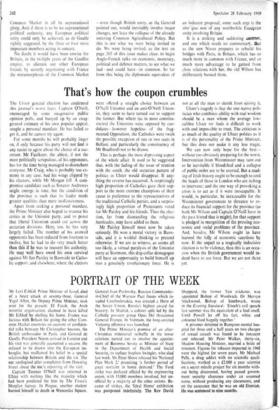That's how the coupon crumbles
The Ulster general election has confirmed this journal's worst fears. Captain Q'Neill, encouraged by some imaginative public opinion polls, and buoyed up by an exag- gerated estimate of his own popular appeal, sought a personal mandate. He has failed to get it, and he cannot try again.
For some months he will probably linger on, if only because his- party will not find it any easier to agree about the choice of a suc- cessor. Mr Faulkner, the ablest, if not the most politically scrupulous, of his opponents, has for the time being managed to disenchant everyone. Mr Craig, who is probably too ex- treme in any case, had his wings clipped by his electors, while Mr Morgan fell. A com- promise candidate such as Senator Andrewes might emerge in time, but the condition of the province is such that its leader needs greater qualities than mere inoffensiveness.
Apart from seeking a personal mandate, the Prime Minister also hoped to trounce his critics in the Unionist party, and to prove that liberal Unionism could cut across the sectarian divisions. Here, too. he has very largely failed. The number of his avowed opponents has been reduced from fourteen to twelve, but he had to do very much better than this if be was to reassert his authority. He may well have owed his own survival against Mr Ian Paisley in Bannside to Catho- lic support, and elsewhere, where the electors were offered a straight choice between an O'Neill Unionist and an anti-O'Neill Union- ist, they seem to have turned out to support the former. But where (as in most constitu- encies) the Unionists were opposed by can- didates—however hopeless—of the frag- mented Opposition, the Catholics were (with the possible exception of one or two seats in Belfast, and particularly the constituency of Mr Bradford) not to be drawn.
This is perhaps the most depressing aspect of the whole affair. It used to be suggested that, with the fading of the issue of reunion with the south, the old sectarian pattern of politics in Ulster would disappear. If any- thing the reverse has occurred..A surprisingly high proportion of Catholics gave their sup- port to the more extreme champions of their cause in preference to the representatives of the traditional Catholic parties, and a surpris- ingly high proportion of Protestants voted for Mr Paisley and his friends. Thus the elec- tion, far from dismantling the religious barricades, may have added to them.
Mr Paisley himself must now be taken seriously. He won a moral victory in Bann- side, and it is wishful thinking to pretend otherwise. If we are to witness, as seems all too likely, a virtual paralysis of the Unionist party at Stormont, this dog-collar demagogue will have an opportunity to build himself up into a genuinely revolutionary force. He is not at all the man to shrink from seizing it.
Ulster's tragedy is that the one native poli- tician who combines ability with real wisdom should be a man whom the average low- calibre Ulster MP finds it difficult to work with and impossible to trust. The criticism is as much of the quality of Ulster politics as it is of the personality of the Prime Minister, but this does not make it any less tragic.
We can now only hope for the best— without too obviously preparing for the worst. Intervention from Westminster may turn out to be inevitable if bloodshed and a collapse of public order are to be averted. But a read- ing of Irish history ought to be enough to cool the heads of those in London who are itching to intervene; and the one way of provoking a crisis is to act as if it were inescapable. It would, in particular, be inexcusable for the Westminster government to threaten to re- duce its financial support for the province (as both Mr Wilson and Captain. O'Neill have in the past hinted that it might), for that support is pledged in recognition of the pressing eco- nomic and social problems of the province. And, besides, Mr Wilson ought to have learned the folly of economic sanctions by now. If the sequel to a tragically indecisive election is to be violence, then this is an occa- sion when the British government would in- deed have to use force. But we are not there yet.


































 Previous page
Previous page